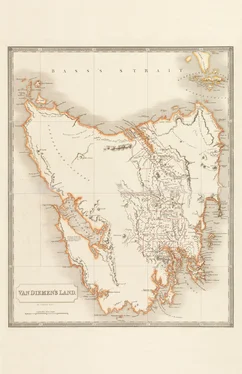Hazel shrugged.
Evangeline noticed the smattering of freckles across the girl’s nose, her eyes, as blue gray as wood pigeon feathers, the russet fringe of her lashes. “Do you have a favorite?”
“No.”
“You’re a Presbyterian, aren’t you?” When Hazel frowned, Evangeline added, “Scotland. I assumed.”
“Hah. Well. Never been much of a churchgoer.”
“Your parents didn’t take you?”
She almost looked amused. “Me parents . . .”
They sat in awkward silence for a moment. Evangeline tried a different tack. “I noticed your tattoo.” She touched her own neck. “A moon. It’s a fertility symbol, isn’t it?”
Hazel made a face. “I saw this play once. The characters were drunk, talking nonsense. ‘I was the man i’ the moon when time was.’ I thought it was funny.”
“Oh!” Finally, common ground. “ The Tempest .”
“Ye seen it?”
“It’s one of my favorites. ‘O brave new world, / That has such people in’t!’”
Hazel shook her head. “I don’t remember much, to be honest. It was confusing. But it made me laugh.”
“You know . . . the surgeon has a whole shelf of Shakespeare in his office. Maybe I could ask to borrow one.”
“Eh. Don’t have much use for reading.”
Ah, Evangeline thought. Of course. “You know . . . I could teach you to read, if you want.”
Hazel gave her a hard look. “I don’t need help.”
“I know you don’t. But . . . it’s a long journey, isn’t it? Might as well have something to do.”
Hazel bit her lip. Her fingers strayed absently over the cover of the Bible. But she didn’t say no.
They started with the alphabet, twenty-six letters on a piece of slate. Vowels and consonants, sound and sense. Over the next few days, as they sat together, knitting words, Hazel shared small bits and pieces of her past. Her mother had built a thriving practice as a midwife, but something happened—someone had died, a mother or child or both. She lost her reputation, and with it, her paying clients. She started drinking. Leaving Hazel alone at night. She pushed her out the door to beg and pick pockets on the streets when Hazel was eight years old. Hazel was no good at thievery; she was nervous and indecisive, and kept getting nabbed by the police. The third time she was hauled into court—when she was fifteen, for stealing a silver spoon—the judge had had enough. He sentenced her to transport. Seven years.
She hadn’t eaten in two days. Her mother didn’t even come to the hearing.
Evangeline looked at her for a long moment. If she expressed any pity, she knew, Hazel would slip away. E-A-T, she wrote on the slate . D-A-Y.
Even after she’d lost everything, Hazel’s mother still practiced in secret. There were plenty of desperate women who needed help. She treated wounds and infections, cough and fever. If a woman didn’t want a baby, she made her problem disappear. If a woman did, she showed her how to nurture and protect the life growing inside her. She turned babies around in wombs and taught new mothers how to feed them after they were born. Many women were afraid to go to the lying-in hospital to deliver their babies because of the stories about childbed fever, an illness that began with sweating and shaking and almost always ended in death, in an agony of vomit and blood. Hazel shook her head at the memory. “Only in hospital. Not in the tenements with the midwives. They say it’s because the poor are hardy, like farm animals.”
P-O-O-R. F-A-R-M.
“But that’s not the reason,” Hazel said. “The doctors touch the dead and don’t wash their hands. Midwives know it, but no one listens.”
Evangeline palmed her stomach. Prodded it to feel the lumpy limbs just beneath the skin. “Did you learn from your mother?”
Hazel gave her an appraising look. “You’re afraid of birthing.”
“Of course.”
Hazel’s lips twisted into a smile. It was peculiar on her, like a grin on a fox. “She was no good at being a mother. But she was a good midwife. Still is, for all I know.” She tilted her chin at Evangeline. “Yes, I learned.”
Medea , 1840
In a great whoosh of flapping sails, the Medea cleared the English Channel and made her way into open ocean, heading south toward Spain. Nothing but water and sky visible for miles. Standing at the railing, gazing out at the expanse, Evangeline thought of a line from Coleridge: Alone, alone, all, all alone, / Alone on a wide wide sea!
In early morning, fog clung to the water like cotton batting. The air was cool and fresh after the stench of the orlop deck, and smelled of pine tar. Women jostled and bartered for places in line; if you were sick, unlucky, or lazy enough to come last, you got the gruel that was burned and congealed at the bottom of the pot. The water they drank, stored in a wine cask, was muddy and tasted as if it had been drawn from a ditch. Evangeline learned to wait a few minutes after it was poured in her cup for the sediment to sink to the bottom.
The gruel was supposed to hold them until midafternoon, when the women lined up once more, for their final meal of the day: a watery broth of cabbage and turnip and, if they were lucky, tough, salty beef or dried cod, with a hardtack biscuit and another cup of muddy water.
Evangeline was assigned to a work crew of six women. On a revolving schedule they emptied chamber pots, boiled dirty laundry, cleaned the sheep and goat pens, collected eggs from the hens stacked in cages on the main deck. They coiled sodden rope that had been dumped in a tangle and scrubbed the orlop deck with stones and sand and a straw-bristle brush. They washed the main deck and privies with a mix of lime and calcium chloride that made their noses burn and eyes water.
As the days passed Evangeline adjusted to the swaying and creaking, the ebb and flow of the waves. Mimicking the sailors, she began walking flat-footed, rocking her hips and bending her knees with the movement of the ship, anticipating the pitch of the deck as it rolled from side to side. The motion of dancing, she thought. Of courtship. She discovered hidden handholds all over the ship, tucked under banisters and ledges and built into ladders, to grab when the sea was rough. Soon enough, despite her growing bulk, she could climb from orlop to tween, from tween to the main deck, as fast as any crewman. She learned where to sit or stand to avoid the spray, how to dodge puddles, how to navigate around rum barrels and tangles of rope without tripping, where to find sunlight at different times of the day. She skirted the grasping hands of sailors as she passed and avoided their sleeping rooms on the tween deck. She got used to the taste of salt on her lips, which she had to rub with lard and whale oil to keep from cracking. Her hands became tough and red and strong. She got used to the chaos: the toll of the bell every half hour, the constant bleating of goats and honking of geese, the reek of the privies and bilge.
On temperate afternoons the captain brought his orange pet canary in a rusty cage onto the main deck, where it chirped shrilly for hours, perched on its tiny swing.
She got used to the chirping.
As if memorizing subject-verb agreements in Latin, she taught herself the language of sailing. Facing the ship’s front—the bow—port was on the left, starboard on the right. The back of the ship was aft. Windward, naturally, meant the direction the wind was blowing; leeward, the opposite. The horizontal pole at the bottom of the mast, the boom, controlled the wind power of the sails.
The sailors were busy from dawn until dusk, raising and lowering the sails, climbing up and down masts like the acrobats in Covent Garden, patching huge sections of canvas, greasing cables, splicing rope. Evangeline had never seen a man with a needle and thread, and was surprised to learn how adept the sailors were at stitching. Two or three of them would sit amidships on the deck with legs outstretched, mending a sail with long needles and coarse thread, thimbles on the balls of their thumbs attached to their wrists by leather straps.
Читать дальше












